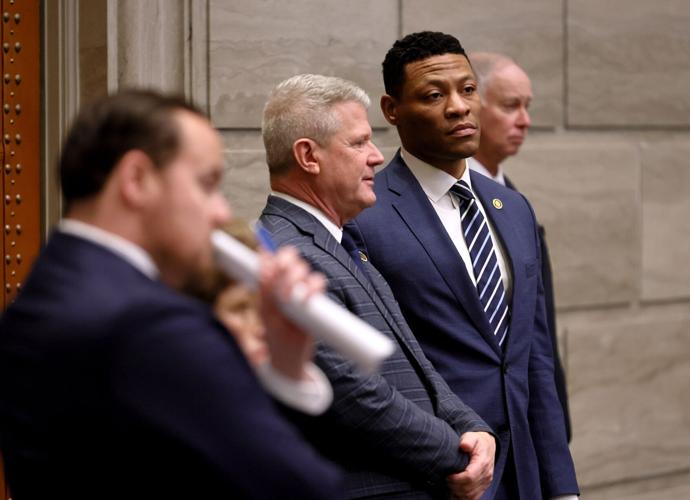
51║┌┴Ž area Senators Doug Beck, center, and Brian Williams, right, stand to the side in Senate chambers as other lawmakers give speeches on the floor at the Statehouse in Jefferson City during the start of 2024 Missouri legislative session on Wednesday, Jan. 3, 2024.┬Ā
JEFFERSON CITY ŌĆö Republicans in control of the Missouri Senate opened debate Monday on a plan to make constitutional amendments ŌĆ£more difficultŌĆØ in the wake of recent progressive wins at the ballot box.
The chamber began debating the plan shortly before 4:30 p.m. Monday. Democrats launched into a filibuster, blocking a vote on the measure.
The Senate paused debate shortly after 9:45 p.m. and adjourned for the day without taking action on the proposal, sponsored by Sen. Mary Elizabeth Coleman, R-Arnold.

Sen. Mary Elizabeth Coleman, R-Arnold.
Hours earlier, Coleman said in kicking off debate that her plan ŌĆ£is about wanting to do one thing and one thing only: itŌĆÖs about wanting to make sure that our founding document is kept in a preserved and made more difficult to change.ŌĆØ
Debate Monday followed weeks of pressure by a hard-line faction of Senate Republicans to respond to the January launch of a pro-abortion rights signature-gathering effort with action on changes to the initiative petition process.
People are also reading…
The measure before the upper chamber on Monday would require constitutional amendments to win a simple majority statewide as well as majorities in five of eight U.S. congressional districts.
Voters would get the final say on whether to make citizen-led initiative petitions more difficult.
Republican proponents want the initiative petition changes on the August ballot, hoping that if an abortion question appeared before voters in November, it would be more difficult to approve.
Many Republicans have also criticized other constitutional amendments voters have approved in recent years, including Medicaid expansion in 2020 and marijuana legalization in 2022.
Coleman said the state has incentivized people to change the state constitution, stating that it was ŌĆ£as easyŌĆØ to change the constitution as it is to change state statute.
It is true that both statutory and constitutional amendments pass with a simple majority in Missouri. But it is more difficult to place a constitutional amendment on the ballot.
Campaigns from 8% of legal voters in six of eight congressional districts for constitutional amendments. Proposed changes to state law require signatures from 5% of legal voters in the same number of districts.
Voters also legalized medical marijuana in 2018 through a constitutional amendment after repeated failures to pass medical marijuana legalization through the Legislature.
ŌĆ£They had to go around the Legislature. And thatŌĆÖs whatŌĆÖs getting lost in all of this,ŌĆØ said Sen. Tracy McCreery, D-Olivette.
And, while lawmakers and the governor may repeal voter-enacted statutory changes, voters would need to weigh in on any changes to constitutional amendments they had previously approved.
McCreery said the reason people were pursuing constitutional changes is because ŌĆ£politicians canŌĆÖt be trusted to do what their own constituents want them to do.ŌĆØ
In addition to asking voters to require support from a majority of congressional districts, ColemanŌĆÖs measure would also restrict the kinds of topics future constitutional amendments may address.
The measure would ask voters to prohibit future constitutional amendments on permitting lobbyist gifts, raising food sales taxes, reducing money for law enforcement, and prohibiting money for securing the border.
It also seeks to ban foreign interference in initiative petitions, and limit voting on initiative petitions to U.S. citizens, though voting is already restricted to U.S. citizens.
Sen. Doug Beck, D-south 51║┌┴Ž County, said Republicans added in ŌĆ£a load of ballot candyŌĆØ to make the initiative changes easier to pass.
McCreery referenced comments by House Speaker Dean Plocher, R-Des Peres, last year predicting that an abortion referendum would pass with a simple majority.
ŌĆ£We now know why this is the RepublicansŌĆÖ No. 1 priority,ŌĆØ she said.┬Ā
McCreery said she gave Republicans a chance last week to partially reverse the ŌĆ£trigger lawŌĆØ they approved in 2019, which since June 2022 has only allowed abortions in medical emergencies.┬Ā
McCreery had proposed an amendment to a measure seeking to defund Planned Parenthood that wouldŌĆÖve allowed abortions in cases of rape and incest.
ŌĆ£I gave the Republicans a chance the other night to actually right a wrong that they created. I think it wouldŌĆÖve ... helped them a little bit this fall, quite honestly,ŌĆØ she said.
ŌĆ£But not one person that was in this chamber showed any compassion to women or children who have been the victims of forceable rape that resulted in a pregnancy,ŌĆØ McCreery said.
The legislation is .
Updated at 9:55 p.m.
Sen. Rick Brattin gives a press conference with other members of the Freedom Caucus to discuss initiative petition changes and the importance of passing them given an effort to have Missouri voters weigh in on abortion access, and steps the Republicans in the Senate have taken against caucus members. Brattin spoke on Thursday, Jan. 25, 2024. Video provided by the Senate media office; edited by Beth OŌĆÖMalley.


















